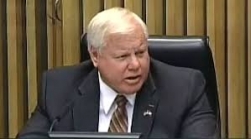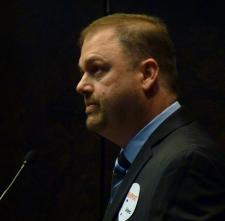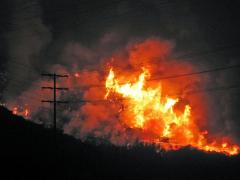
By Miriam Raftery
View video of full hearing: http://sdcounty.granicus.com/MediaPlayer.php?view_id=9&clip_id=1660
Note: Tune in Friday to our radio show on 89.1 FM from 5 to 6 p.m. to hear interviews with Boulevard residents and a hydrologist sharing their views on this outcome. Jim Whelan, a representative of Soitec project property owners Hamann and Gibson was invited and refused to participate.
February 4, 2015 (San Diego) – Boulevard residents fought down tears in stunned disbelief today (photo, left) as San Diego Supervisors voted 4 to 1 to approve Soitec’s Tierra Del Sol and Rugged Solar projects, overriding a unanimous vote by Boulevard’s elected planning group that opposed the projects. Collectively the two massive projects will cover 1,185 acres (the equivalent of 185 city blocks) of rural terrain with thousands of concentrated solar tracking panels, each 48 feet wide by 30 feet tall.
Only Supervisor Dianne Jacob voted against the project, following an extensive speech in opposition. She called county staff’s finding that the project was compatible with rural community character “absolutely incomprehensible to me.” Jacob pointed out that the General Plan is supposed to assure environmental stewardship, preservation of agricultural lands, open space and community character, among other qualities – all of which will be destroyed if the Soitec projects are built.
East County's Supervisor Jacob (photo, right) also called the projects “bad for taxpayers” and noted that despite $140 million in tax credits, the projects will provide just 27 permanent jobs. Financially troubled Soitec recently laid off 100 workers.
By contrast, Jacob compared that to the county’s PACE program that encourages rooftop solar, a program that has created 349 jobs—a far better way to stimulate the economy and produce renewable energy, she argued. But her words fell on deaf ears.
 Chairman Bill Horn (photo, left courtesy KFMB), smirking, told Jacob after her speech, “Thank you for the filibuster.”
Chairman Bill Horn (photo, left courtesy KFMB), smirking, told Jacob after her speech, “Thank you for the filibuster.”
To the beleaguered residents of Boulevard, the outcome was no laughing matter. The community’s lifeblood—groundwater—is at stake, along with fire safety, property values, wildlife habitat and quality of life.
Jim Bennett, the County’s hydrologist, dismissed serious concerns raised by two professional hydrologists who both predict the project developer has severely underestimated water use and that the project could result in dry wells, negative property impacts on neighbors and permanent damage to the ecosystem.
Hydrologist Scott Snyder testified, citing a list of projects that Soitec’s consultant, Dudek, has underestimated water usage on in the past, including a golf course where neighbors’ wells went dry. He also cited the ECO substation, which used 90 million gallons of water – three times more than SDG&E had estimated.
Astonishingly, Snyder testified, the Soitec projects in Boulevard will disturb 900 acres of land and will require 14 times more soil disturbance than Soitec’s 67-acre Desert Green project. Yet Soitec inexplicably predicts that its Boulevard projects will use less water.
County staff has failed to provide any explanation for why they found that Soitec claim credible, Snyder told ECM. (photo, left: site of one of Soitec's planned projects, slated to be scraped to the bare earth)
Jacob said water was her greatest concern, followed by fire. As for water, she said, “It’s the lifeblood of a community. If there is no water, there is no life.” She grilled Bennett on whether he could guarantee that people in Boulevard would not have their well water dry up. Ultimately he admitted, “An absolute gurantee cannot be made,” a response echoed by Brown. Jacob noted that in the drought, some wells in East County are already going dry.
Staff threw just one bone to concerned residents, agreeing to monitor wells for a mile around the projects – though many fear that’s not enough.
The owner of Live Oak Springs Water said he is prepared to sell more water to Soitec if needed, however that was scant comfort to backcountry residents, given that Live Oak Springs was put into receivership by the state after being caught illegally selling off groundwater to developers and falsifying health records in the past.
For Paula Byrd (photo, right), the project evokes “sad memories” of a home she and her husband were forced to leave behind in Lakeside’s Muth Valley after their well went dry. She faults construction of Barona Casino six miles away for that water loss, which caused her family to spend $20,000 drilling new wells only to ultimately give up and move to Boulevard. She says she asked County staff “What guarantee is there that this won’t happen again? They said none. I fail to understand the county’s lack of concern for our irreplaceable water supply.”
After the vote, she told ECM that she feels that she’s now living “a continuing nightmare.”
Donna Tisdale, chair of the Boulevard Planning Group and founder of the nonprofit Backcountry Against Dumps (BAD) faulted project proponents for “weasel words.”
“It’s energy sprawl. It is industrial blight,” she said of the projects that she believes will destroy her community’s character as well as increasing fire risk and exposing residents to glare that staff admits will be present morning and evening for some homes year-round. “We are not an experimental lab rat community,” Tisdale said, then showed photos of glaring Soitec panels in a coastal location as well as a Borrego solar site by Soitec that has been completely scraped bare of all vegetation.
Tisdale also showed photos of signs at another solar project warning of cancer risk and electrical hazards.
BAD has vowed to sue if Supervisors approve the project, and Tisdale handed staff a CD for the record “for the judge to see.” (Contributions to the legal effort are being accepted; for information contact tisdale.donna@gmail.com.)
Boulevard's community planners previously voted unanimously to oppose the project, but were overridden by county planners and supervisors, none of whom live in Boulevard, where the negative consequences will be felt.
Soitec spokesman Patrick Brown urged Supervisors to “expedite innovative projects and keep jobs in California,” even though Soitec just laid off 100 workers at its San Diego factory and Soitec’s board has reportedly voted to get out of the solar business following cancellation of contracts and plummeting stock prices.
 Brown (photo, right) testified that Boulevard was chosen because of its “excellent solar resources” as well as its location outside the marine layer, high elevation, low residential density, and proximity to new utility infrastructure. He also observed that with closure of the San Onofre nuclear generating stations, SDG&E must make up 800 megawatts of power production.
Brown (photo, right) testified that Boulevard was chosen because of its “excellent solar resources” as well as its location outside the marine layer, high elevation, low residential density, and proximity to new utility infrastructure. He also observed that with closure of the San Onofre nuclear generating stations, SDG&E must make up 800 megawatts of power production.
He rejected calls to reopen the environmental impact report to assess omissions such as 165 batteries each the size of cargo shipping containers, adding, “Any attempt to bring the ERI back would delay and kill our project.” He also claimed undergrounding power lines to lessen fire hazard would be infeasible.
Jacob insisted that if her colleagues approved the project over her objections, they should require that all water be imported from Padre Dam Municipal Water District, not just a portion. Brown said the $4 million cost to do that would be prohibitive.
Soitec will fund $7.5 million in community benefits to Mountain Empire Health, as well as the County Fire Authority and buying county groundwater monitoring equipment. The project would create 300 temporary construction jobs and bring tax revenues to the county, Brown added.
Jim Whelan of J. Whelan and Associates spoke on behalf of Hamann Companies and John Gibson, owners of the land on which the Rugged Solar project is slated to be built. He denigrated community groups opposed, faulted “funded opposition” from Protect Our Communities foundation and Backcountry Against Dumps, both nonprofit citizens’ groups, for forcing up the cost of permitting. He further called claims made in a letter sent by BAD threatening legal action if the project is approved “very imaginative.”
Other testifying in favor included representatives of the Mountain Empire School District, the East County Community Development Council, Mountain Empire Health, the Alpine chamber of Commerce and CleanTech San Diego.
Jim Waring with CleanTech urged Supervisors to brand our region “around the world as leaders” who are “thinking ahead 10 to 20 years on behalf of our communities.”
But backcountry meetings have been packed with community members opposed to the projects. Some made the hour and a half drive downtown to testify and implore Supervisors to vote down the project.
Michele Strand bought a home in Boulevard a decade ago for “pure enjoyment of peace and quiet.” She drives over 100 miles a day to and from work. “Soitec does not belong in a rural neighborhood,” she said.
Strand noted that most of the speakers in favor are “all getting paid…Who doesn’t get paid? Me. We who live there.” She complained that on project after project, Supervisors and County planners have over-ruled votes by Boulevard’s elected planning group, which unanimously voted to oppose the Soitec projects and other major energy projects in the area. “If we’re constantly overridden by all the money going around….that’s distressing,” she observed, adding that “San Diego County should be America’s finest county.” Instead, she fears, “We’ll be a dust bowl.”
Katie Williams Bloom lives 50 feet from the Tierra del Sol project across the street. She says it’s “unbelievable” that a “massive industrial project” would be put in a neighborhood where children live and play. “We don’t even know the health impacts,” she said. She also objects to the projects scraping bare nearly 1,185 acres of high desert and worries that Soitec’s technology is “already obsolete”, voicing concerns over who will maintain the projects in this area known for high winds if Soitec pulls out of the solar business.
“We all want green,” she emphasized, but added, “Let’s put it on top of buildings and carports…it’s much cheaper and more economical.”
A man from Boulevard likened the scenario to investing in Solyndra, a failed company. He also cited concerns over toxins that could be released if the project should catch fire.
Daniel Reynard (photo, right) bought a home on Old Highway 80 for his retirement. “My family and I wanted to move to the country.” He says they did due diligence and learned the home was along a designated scenic highway. He expressed shock and horror that a “30 foot high monstrosity producing glare along the interstate” was even being considered, saying it “boggles the mind…Who will replace the wildlife on 1200 acres that is going to be bulldozed?”
Linda Shannon fears, “If my well goes dry my property will be worth nothing.” She also fears fire danger posed by the last-minute addition of massive batteries each the size of cargo shipping containers. “Dudek says the primary hazard associated with these batteries is fire. So they knew,” she says. “I’m concerned with losing my water…I’m concerned with losing my home.”
Bob Maupin voiced frustrating that having a local planning group is “meaningless” if Supervisors vote to turn once-quiet residential land into a “massive industrial complex.” He voiced concerns over trucking in non-potable water and using dust suppression chemicals that could contaminate the groundwater supply.
Maupin summed up the sentiments of many residents, stating, “Ths project will cause the rape of the Boulevard community.”
Kelly Fuller, Executive Director of Protect Our Communities foundation and formerly with the American Bird Conservancy in Washington D.C. pointed out that the U.S. Fish & Wildlife Service wants additional studies on golden eagles and that state and federal wildlife agencies found the CEQA (California Environmental Quality Act) analysis questionable. She also questioned the reliability of bird body counts porposed by Soitec to be done by maintenance and operations personnel, not biologists.
Many raised concerns over the impacts on wildlife, bringing photos of butterflies and birds such as the great-horned owl on Tisdale's property (photo, left), worrying what will become of them once 1,185 acres of foraging habitat are removed.
When it came time for Supervisors to weigh in, Supervisor Jacob affirmed that she is a “big supporter” of renewable energy but cited the county’s PACE program for rooftop solar as her idea of the right way to incentivize renewable energy.
“What’s important to me,” she said, noting that she read all the documents,” is the people who live out there.” She argued that residents’ property rights should be just as important as a developer’s property rights or the property rights of people in wealthy enclaves such as La Jolla or Rancho Santa Fe.
Jacob noted that San Diego has among the highest electricity rates in the neighborhood and predicts that the Soitec project and other factors will “increase rates at an alarming rate.”
She pointed out that one of the largest buildings in the U.S. is Boeing’s factory, but that the Soitec projects are the equivalent of “10 Boeing factories in our backcountry.”
Jacob, whose district includes Boulevard, voiced puzzlement over how staff could allow the project in the region that has repeatedly been scorched by severe firestorms driven by winds up to 100 miles per hour. She pointed out that the documents stated “high intensity fire can be expected in the area and would be a risk to the project,” while new power lines would also increase fire risk.
 Mitigation proposed only addresses issues after fires start, not preventing them, she said. “What caused three fires in 2007? Arcing lines,” she said.
Mitigation proposed only addresses issues after fires start, not preventing them, she said. “What caused three fires in 2007? Arcing lines,” she said.
A staffer said the lines are designed to prevent arcing and that lines should shut off if a short occurs. Brown said power lines are “all over the state and they are not arcing and sparking,” to which Jacob retorted, “Well, they sure did in this county.”
Arcing SDG&E power lines have been blamed by the California Public Utilites Commission for some of the worst fires in the 2007 firestorms that devastated our region in California’s second worst firestorm on record.
Jacob concluded, “The only way to mitigate fire is to underground the lines. If they can’t underground the lines, maybe they shouldn’t do it at all.”
Mark Ostrander, former Cal Fire Battalion Chief, testified of serious fire concerns raised by the project. “We have no haz-mat team,” he observed, adding, “We may be losing our closest fire station” along with a fire engine in the area. He called for lines to be placed underground if the project is built.
Supervisor Dave Roberts (photo, right), the newest member of the board, admitted to feeling conflicted, despite later voting in favor of the project. “What we have here is a collision of some of my core principles,” he said, citing protecting communities, standing up for property rights, and concerns over stat4e mandates to reduce greenhouse gas emissions.
He voiced bafflement over “how something like this happened” without variances ( seeimingly unaware that Supervisors previously voted 4-1 to gut Boulevard’s community plan, which the community spent 20 years creating.) He asked staff why they believed this project is compatible with Boulevard’s community plan. A staffer replied that “It’s not an industrial scale energy project; it’s not a coal mine,” to which residents groaned in dismay.
Roberts insisted the project is “perfectly allowable” and motioned to approve staff’s recommendation for the projects, with two proposed modifications. He asked that the county make unannounced inspections paid for by the applicant and that property owners be given information promptly if water tables are dropping. No member seconded his motion.
Dave Roberts said if the process is “something we don’t want we should work on it” and noted that utilites don’t get credit for solar on roofs. “I think that is wrong,” he said adding that he’s talked to the Governor. But for the Soitec projects on the table, he said, “they are perfectly allowable.”
Supervisor Ron Roberts motioned to approve the staff recommendations as is. “I don’t know that we’ve ever had a more fundamentally investigated project,” he said, adding that electric cars in the future will increase energy demand. “We need electricity and we’re not overflowing with sites,” he said, adding that he does not believe the projects are industrial. He described the Soitec project as “a passive thing that will collect sun” and insisted that “rooftop solar doesn’t give us as much bang for the buck.”
As for Soitec’s finances, he said, “Whether Soitec is financially stable or not is not a concern for us. We have to base our decision on land use.”
Supervisors then voted 4-1 for the projects, with only Supervisor Jacob opposed.
After the vote, Boulevard resident Ruth Shannon voiced anger and frustration. “I wish someone would buy me out,” she said, adding that she has asked for this but was rebuffed. “They looked at me like I was some stupid country girl.”
Now, she says of those responsible for industrializing rural Boulevard with giant solar trackers, “I hope they go to hell, where it is warm.”







Comments
Shell Game Democracy
Way past time...
Soitec Project
Exactly right, Parke. Dave
Small town bulling in rural areas
Infuriating.This only goes
A DARK DAY FOR DEMOCRACY
Definition Of Rural